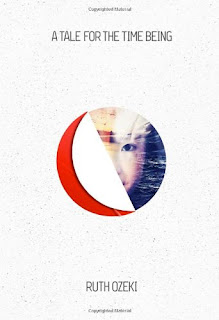"For Books are not absolutely dead things, but doe contain a potencie of life in them to be as active as that soule was whose progeny they are; nay they do preserve as in a violl the purest efficacie and extraction of that living intellect that bred them." - John Milton
Sunday, 28 June 2015
Ruth Ozeki - A Tale For The Time Being
Rating: 4/5
Review:
Readable and intelligent
I thought this a very good book in many ways and although it did take me a long time to get into it, I found it a very involving and rewarding read in the end.
Ruth Ozeki writes very readable prose which is sometimes rather beautiful but never tips over into the self-regarding. The story, well summarized elsewhere, is of a writer (Ruth) on a remote Canadian island who discovers, washed-up on the beach, a container with letters and the diary of a Japanese schoolgirl (Nao). The narrative alternates between the diary and Ruth reading it and investigating its story and its author. I confess that I found the first 100 pages or so difficult to get into and a bit stilted and self-conscious, but Nao's voice and her insights into Japanese society drew me in eventually, and I found her story involving and touching. I never quite felt the same about Ruth's sections which always felt slightly artificial and mannered to me, although Ozeki generates a very good sense of place and atmosphere around the characters.
There is a lot of philosophical content here, much of which is very good. It includes some rather profound insights about love, about growing up and learning to look outside yourself and about Zen. Late in the book there is also quite a bit about quantum physics. My heart sinks a bit when I realise that a novelist is starting on quantum physics because it often degenerates into dreadful nonsense, but to Ozeki's credit she gets the physics right, although I thought that her drawing of parallels between quantum physics and Zen were less successful and didn't really add up to that much. (But then, from Fritjof Capra's The Tao Of Physics onward there has been a great deal of nice-sounding verbiage and a good deal less real substance written about physics and Zen, so she's not alone.)
I could also have done without the mystical elements toward the end. (I won't give any spoilers) I could see what Ozeki was driving at and why she structured it as she did, but in a factual narrative it seemed a little silly in places. Not quite Carlos Castaneda, thank heavens, but heading that way at times.
This review may seem rather more critical than I mean it to be. I enjoyed the book in the end and think it had some important things to say. I did have reservations, but would still recommend it as a readable, intelligent and in places quite profound book.
Subscribe to:
Post Comments (Atom)

No comments:
Post a Comment